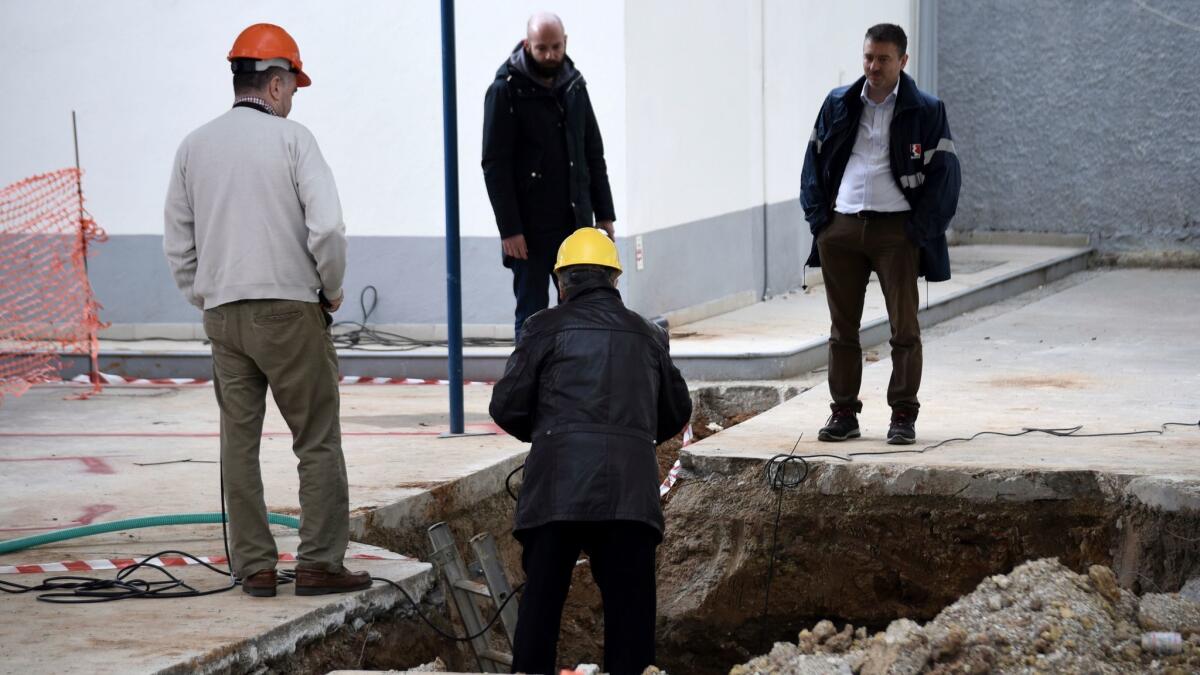Greek officials prepare to evacuate 75,000 people as they defuse unexploded WWII bomb

Authorities in the northern Greek city of Thessaloniki distributed fliers and put up posters Friday as part of preparations to evacuate about 75,000 people in order to defuse a unexploded World War II bomb.
Bomb disposal experts are to tackle the 500-pound device, found buried beneath a gas station, on Sunday in an operation expected to last about six hours. All residents in a nearly 1.2-mile radius are to be evacuated, starting at 7 a.m. local time on that day. Authorities will also evacuate a nearby refugee camp with about 450 residents.
The bomb, dropped during an air raid on the city in the 1940s, was found last week during work to expand fuel storage tanks.
A state of emergency has been declared in the three municipalities involved, and about 1,000 police and 300 volunteers are expected to help out during the evacuation, Thessaloniki’s deputy governor, Voula Patoulidou, told the Associated Press.
“It is the first time something like this is happening in Greece,” Patoulidou said. “The transfer of all residents is mandatory, and we will go door-to-door to make sure everyone leaves.”
Thessaloniki’s long-distance bus terminal, which is in the area, will shut down during the operation, and trains will also stop running to and from the city, as the main railway line passes through the exclusion zone.
Traffic along a major road nearby will be halted, while churches in the area will not hold services.
Army spokesman Col. Nikos Fanios said the device’s exterior was too degraded to be able to determine whether it was a German or an Allied bomb. But one resident said he recalls the day it fell.
“The bombing was done by English and American planes on Sept. 17 1944. It was Sunday lunchtime,” said Giorgos Gerasimou, 86, whose home is about half a mile from where the bomb was found. “We could see the planes coming.”
They were targeting local German rail facilities, he said. Nazi Germany occupied Greece from 1941 until October 1944.
A 13-year-old at the time, Gerasimou said he and his friends would go to the railway station each day for food rations.
“That day something told me I had to leave, and in the end we did,” Gerasimou told the AP. “When I heard the [air raid] sirens, I jumped into a ditch with my friends and we survived.”
Another one of his friends wasn’t so lucky. Ten-year-old Panagiotis was killed in the air raid, Gerasimou said, clutching a photo of the boy that he keeps to this day.
During Sunday’s evacuation, residents will be transported by bus to schools, sports halls and cultural centers elsewhere in the city while the exclusion zone is cordoned off.
Army bomb disposal experts will initially attempt to defuse the bomb’s detonator, and then transport the device to an army firing range, where they will determine what further steps to take, said Fanios, the army spokesman.
“Every operation involving munitions is always difficult,” he said.
Some residents expressed concern about leaving their properties vacant.
“I’m really worried about the house, mainly in case thieves take advantage of the evacuation,” said Giorgos Aravias, 44. “I hope there are security measures in place.”
MORE WORLD NEWS
Iran tones down the anti-Trump messages as it celebrates its revolution
400 whales stranded on remote New Zealand beach; volunteers launch rescue effort
In a shift, Trump endorses ‘one China’ policy in phone call with Xi Jinping
More to Read
Start your day right
Sign up for Essential California for news, features and recommendations from the L.A. Times and beyond in your inbox six days a week.
You may occasionally receive promotional content from the Los Angeles Times.





